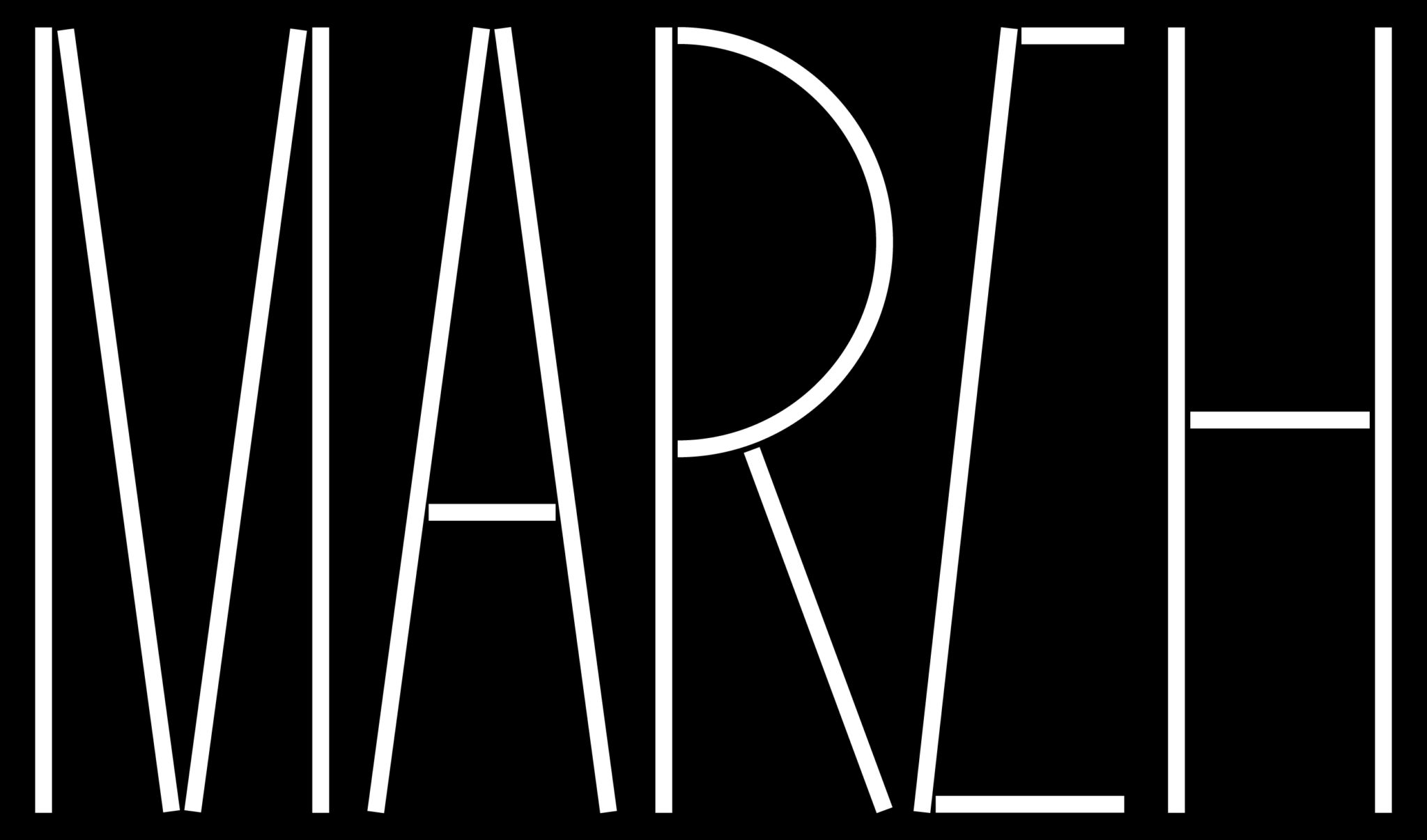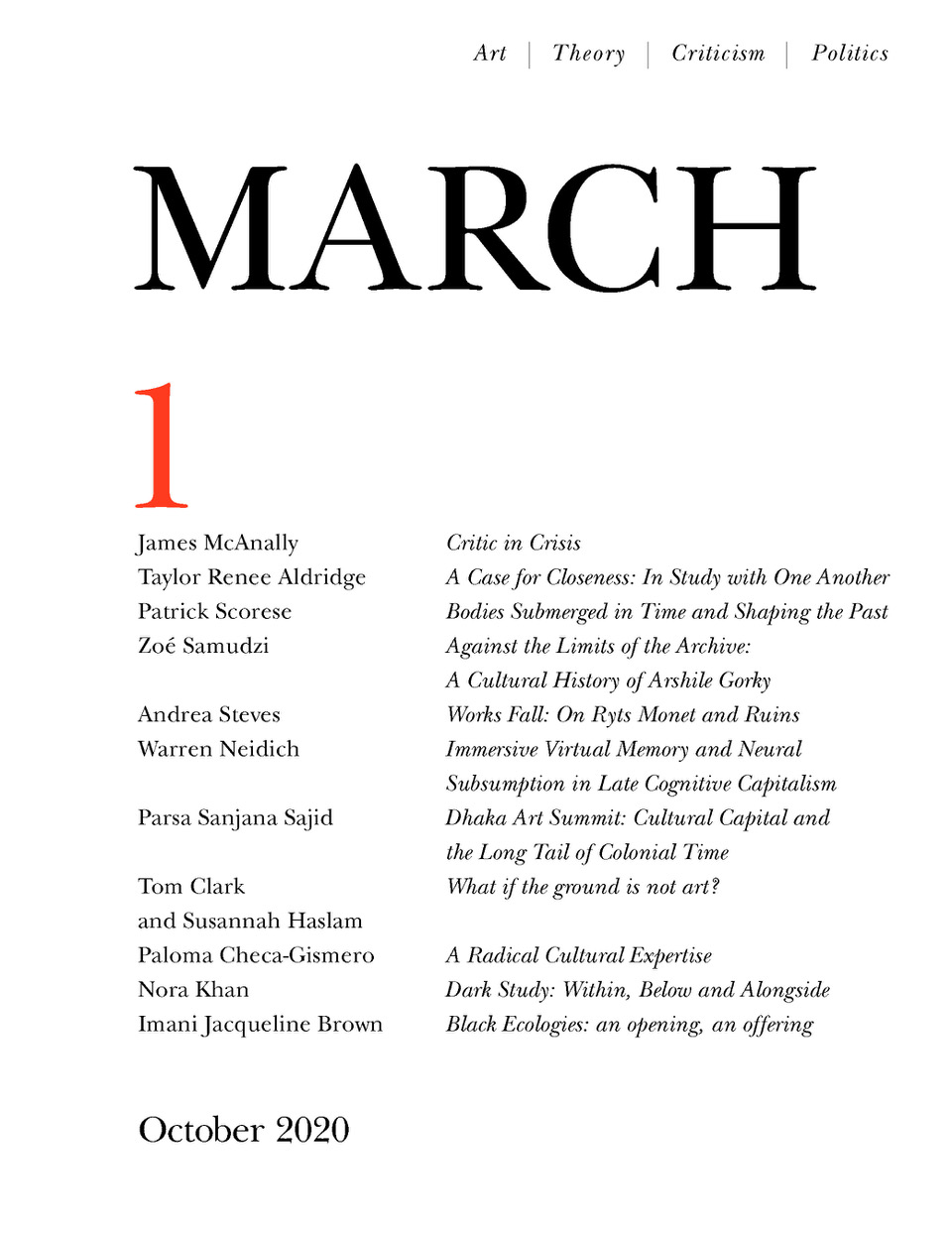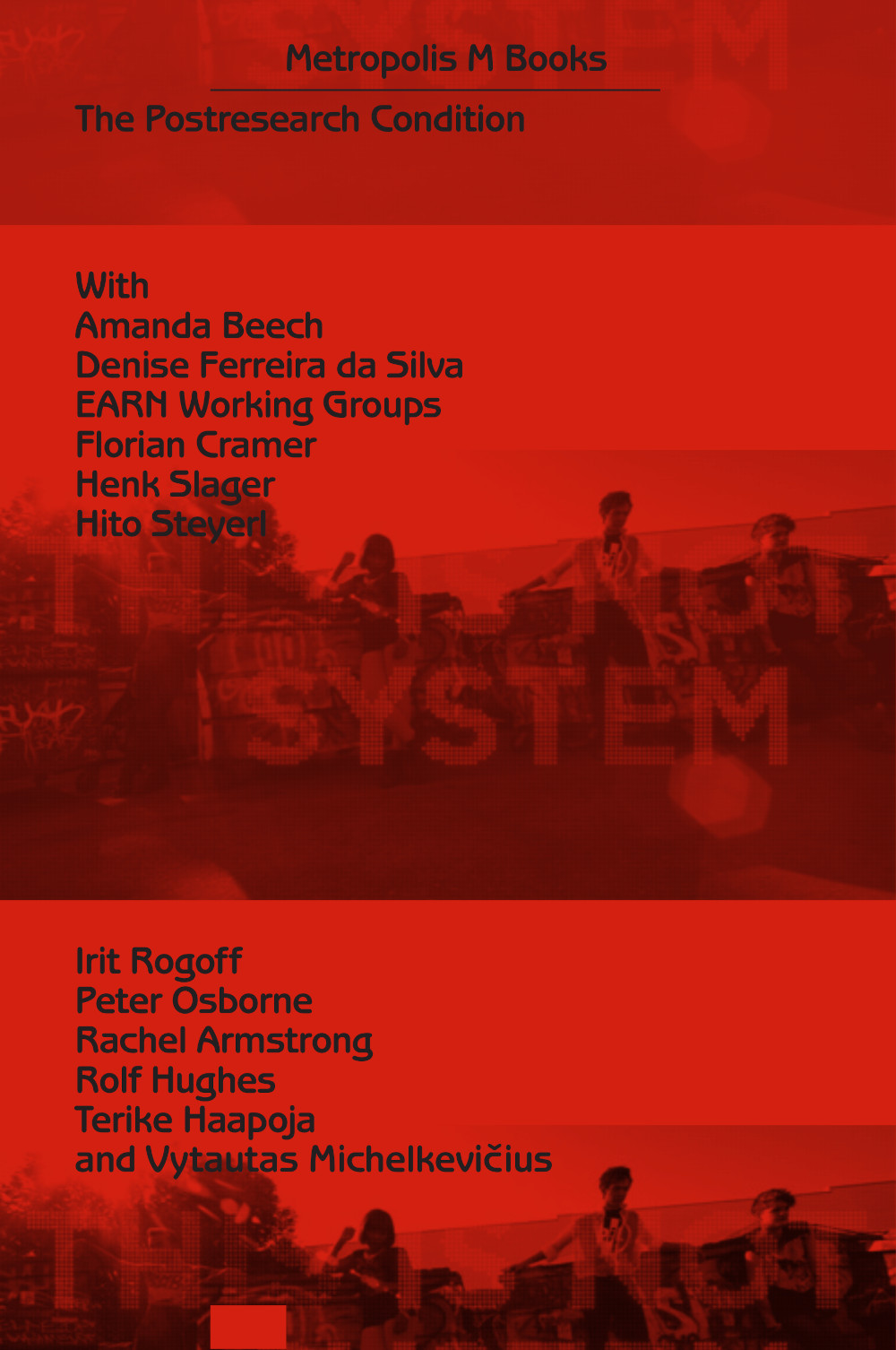MARCH, journal of art and strategy (2020–)
Filed under journal | Tags: · activism, art, black people, critique, politics, protest, publishing, sound


“MARCH embraces publishing as an act of protest to address the critical social and political issues of our time. MARCH emerges at a moment of deepening institutional crisis and is intent on advancing new forms of publication, critique, and public action. We are a partisan publication: we initiate, articulate, advance, and defend prefigurative ideas about what art is, could and should be. We believe in the latent potential critique carries to transform our art worlds, our institutions, our means of expression and experimentation, and ourselves. We are con-temporary, with and in our time—an archive of the present and proposition towards the future—where our ideas, actions and form embodies this insurrection.
MARCH features an annual print edition alongside an active online platform commissioning essays, interviews, and experimental critical writing with a global perspective. ”
Edited by Sarrita Hunn, James McAnally, et al.
Interview with editors: Mela Dávila Freire (A*Desk, 2021, EN/ES/CA).
Issues, features:
Dispatches (2020)
Issue 1 (2020-2021)
Issue 2: Black Ecologies (ed. Imani Jacqueline Brown, 2021-2022)
Publishing as Protocol (eds. with Constant and Vessel, 2021-2023)
Conversations on Sound and Power (ed. Sonic Insurgency Research Group, 2021-2022)
Multidirectional Memory (2022-)
The Postresearch Condition (2021)
Filed under book | Tags: · activism, art, artistic research, contemporary art, curating, knowledge, knowledge production, politics, research

“After an omnipresent “Research Decade,” the concept of artistic research currently seems to be in need of a recharge. Pressing questions are: Should we talk about a postresearch situation or a postresearch condition? Could this be compared with how poststructuralism relates to structuralism as its philosophical comprehension and the elaboration of its consequences? And how could a postresearch condition address contemporary art practices?
To answer these questions, it is important to start from the three conceptual spaces that fundamentally determine what we mean by research: creative practice (experimentality, art making, potential of the sensible); artistic thinking (open-ended, speculative, associative, non-linear, haunting, thinking differently); and curatorial strategies (topical modes of political imagination, transformational spaces for encounters, reflection and dissemination) – and to comprehend these spaces in their mutual, dynamic coherence as a series of indirect triangular relationships.
From whatever conceptual space one departs, an artistic research practice could signify a transversal constellation – as a creative proposition for thought in action. Yet, that mode of research could never be reduced to a method of one of the three constituents. Thus, artistic research cannot be equated with creative innovation, disciplinary knowledge production, or political activism. It seems urgent now to profoundly challenge and question the issue of how to articulate and present the condition of the intersection between the three conceptual spaces.”
With contributions from Peter Osborne, Hito Steyerl, Vytautas Michelkevičius, Florian Cramer, Terike Haapoja, EARN Working Groups, Rachel Armstrong, Amanda Beech, Denise Ferreira da Silva, Irit Rogoff.
Editor Henk Slager
Final editor Annette W. Balkema
Publisher Metropolis M Books, Utrecht, September 2021
ISBN 9789081830270
71 pages
Event website (incl. videos)
Publisher
October, 174: A Questionnaire on Decolonization (2020)
Filed under survey | Tags: · activism, art, black people, collecting, colonialism, decoloniality, decolonization, eurocentrism, history, imperialism, indigenous peoples, land, museum, postcolonialism, race, slavery, violence
“The term decolonize has gained a new life in recent art activism, as a radical challenge to the Eurocentrism of museums (in light of Native, Indigenous, and other epistemological perspectives) as well as in the museum’s structural relation to violence (either in its ties to oligarchic trustees or to corporations engaged in the business of war or environmental depredation). In calling forth the mid-twentieth-century period of decolonization as its historical point of reference, the word’s emphatic return is rhetorically powerful, and it corresponds to a parallel interest among scholars in a plural field of postcolonial or global modernisms. The exhortation to decolonize, however, is not uncontroversial-some believe it still carries a Eurocentric bias. Indeed, it has been proposed that, for the West, de-imperialization is perhaps even more urgent than decolonization.
What does the term decolonize mean to you in your work in activism, criticism, art, and/or scholarship? Why has it come to play such an urgent role in the neoliberal West? How can we link it historically with the political history of decolonization, and how does it work to translate postcolonial theory into a critique of the neocolonial contemporary art world?”
Respondents include Nana Adusei-Poku, Brook Andrew, Sampada Aranke, Ian Bethell-Bennett, Kader Attia, Andrea Carlson, Elise Y. Chagas, ISUMA, Iftikhar Dadi, Janet Dees, Nitasha Dhillon, Hannah Feldman, Josh T. Franco, David Garneau, Renee Green, Iman Issa, Arnold J. Kemp, Thomas Lax, Nancy Luxon, Nelson Maldonado-Torres, Saloni Mathur, Tiona Nekkia McClodden, Alan Michelson, Partha Mitter, Isabela Muci Barradas, Steven Nelson, Ugochukwu-Smooth C. Nzewi, Alessandro Petti, Paulina Pineda, Christopher Pinney, Elizabeth Povinelli, Ryan Rice, Andrew Ross, Paul Chaat Smith, Nancy Spector, Francoise Verges, Rocio Zambrana, and Joseph R. Zordan.
Edited by Huey Copeland, Hal Foster, David Joselit, and Pamela M. Lee
Publisher MIT Press, Fall 2020
Open access
ISSN 0162-2870
123 pages

